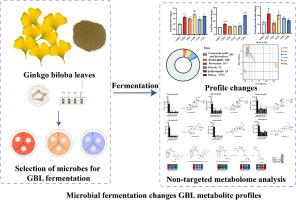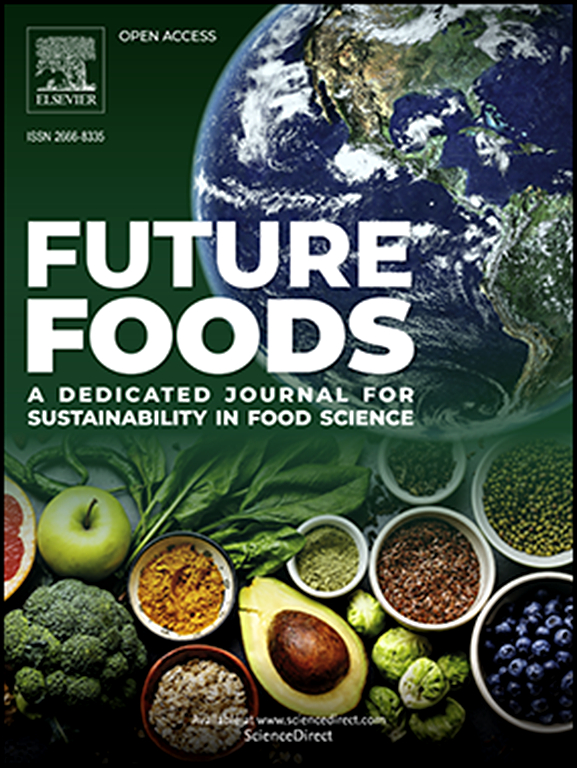微生物发酵改变银杏叶的植物化学特征
IF 8.2
Q1 FOOD SCIENCE & TECHNOLOGY
引用次数: 0
摘要
银杏叶含有多种天然产物。本研究利用微生物发酵技术改变银杏叶的植物化学特征。植物乳杆菌SCTM-1、酿酒酵母菌GLLB-3、黑曲霉ZYDC-1和葡萄曲霉lnac -1这4种微生物分别被单独和联合使用(YXSL: L. plantarum + S. cerevisiae)。所有的微生物发酵都改变了GBL代谢谱,包括总多酚、类黄酮和多糖。特别是,与未发酵的GBL相比,YXSL使总多酚、总黄酮和多糖分别增加了76.0%、170.6%和20.9%。代谢组学分析鉴定出116个差异表达的次生代谢物,主要存在于植物次生代谢物、苯丙素和类黄酮的生物合成途径中。YXSL通过微生物转化特别提高了类黄酮的产量,通过水解藏红花素,藏红花素的含量增加了104.5%。这项工作强调了微生物提高GBL生物活性成分的潜力,并为通过发酵提高植物化学产量提供了基础。本文章由计算机程序翻译,如有差异,请以英文原文为准。

Microbial fermentation alters the phytochemical profile of Ginkgo biloba leaves
Ginkgo biloba contains diverse natural products. This study employed microbial fermentation to alter phytochemical profiles in Ginkgo biloba leaves (GBL). Four microorganisms—Lactobacillus plantarum SCTM-1, Saccharomyces cerevisiae GLLB-3, Aspergillus niger ZYDC-1, and Aspergillus cristasukae LNAC-1—were used individually and in a consortium (YXSL: L. plantarum + S. cerevisiae). All the microbial fermentation changes the GBL metabolite profiles, including total polyphenols, flavonoids, and polysaccharides. Especially, compared to unfermented GBL, YXSL increased total polyphenols, flavonoids, and polysaccharides by 76.0 %, 170.6 %, and 20.9 %, respectively. Metabolomic analysis identified 116 differentially expressed secondary metabolites, mainly in plant secondary metabolite, phenylpropanoid, and flavonoid biosynthesis pathways. YXSL specifically enhanced flavonoid production via microbial biotransformation, with crocetin content increasing 104.5 % through hydrolysis of crocin. This work highlights microbial potential to boost GBL’s bioactive components and provides a basis for improving phytochemical yields via fermentation.
求助全文
通过发布文献求助,成功后即可免费获取论文全文。
去求助
来源期刊

Future Foods
Agricultural and Biological Sciences-Food Science
CiteScore
8.60
自引率
0.00%
发文量
97
审稿时长
15 weeks
期刊介绍:
Future Foods is a specialized journal that is dedicated to tackling the challenges posed by climate change and the need for sustainability in the realm of food production. The journal recognizes the imperative to transform current food manufacturing and consumption practices to meet the dietary needs of a burgeoning global population while simultaneously curbing environmental degradation.
The mission of Future Foods is to disseminate research that aligns with the goal of fostering the development of innovative technologies and alternative food sources to establish more sustainable food systems. The journal is committed to publishing high-quality, peer-reviewed articles that contribute to the advancement of sustainable food practices.
Abstracting and indexing:
Scopus
Directory of Open Access Journals (DOAJ)
Emerging Sources Citation Index (ESCI)
SCImago Journal Rank (SJR)
SNIP
 求助内容:
求助内容: 应助结果提醒方式:
应助结果提醒方式:


